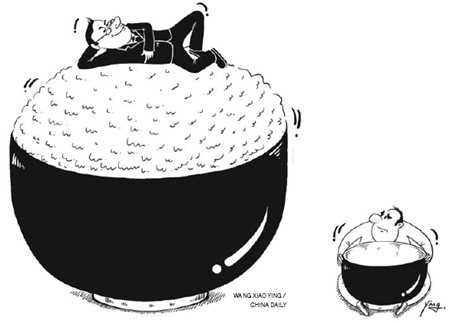Op-Ed Contributors
Five steps to a better society
By Carlos Aquino (China Daily)
Updated: 2010-06-01 07:48
 |
Large Medium Small |

China's economy is growing, but so is its income divide. The Gini coefficient has increased alarmingly. The coefficient measures income inequality in a society, with 0 signifying perfectly equal distribution of wealth among households and 1 denoting that a single household controls all the wealth.
When China's reform and opening up began in 1979, its Gini coefficient was less than 0.35. Today, it is 0.47. If this trend continues, grievances against the system will grow and could threaten the country's stability, as well as economic development.
In a way, the widening income gap in China is the unwanted result of some of its development policies such as opening up the coastal areas first and leaving inland areas behind. This triggered a mass migration from rural to urban areas.
Migrant workers, who migrate to cities in search of better opportunities, are among the poorest people in the country. They cannot fully enjoy the benefits of living in cities, because most of them are not recognized as residents of the cities they work in. According to their hukou (household registration), they are considered rural residents (and cannot become urban dwellers), and thus have no access to housing and healthcare and cannot send their children to school in cities.
The Chinese government has been trying to modify the hukou system, but the process needs to be expedited because millions of more people will move from rural to urban areas.
China must do something to avoid the trap that Latin American countries fell into. The Gini coefficient in Latin American countries is around or even more than 0.50. So, what can China do to ensure that more people share the fruits of its economic growth?
First, the Chinese government should improve the living standards of rural residents, who comprise the largest number of poor in the country, and take steps to raise their income level, which is one-third or even lower than that in urban areas.